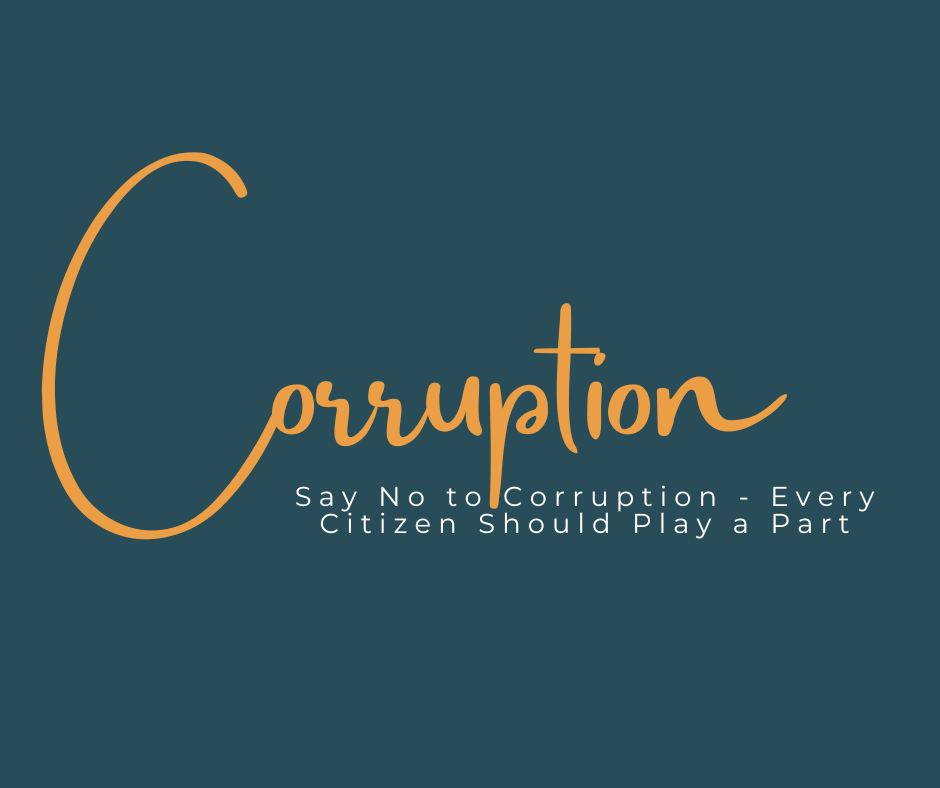C – Commitment
The fight against corruption begins with commitment. Each citizen must pledge to uphold integrity in their personal and professional lives. Commitment to ethical behavior and transparency is the first step in creating a culture that rejects corruption. When individuals commit to honesty and accountability, it sets a standard for others to follow, creating a ripple effect that can transform society.
O – Oversight
Oversight is crucial in the battle against corruption. Effective mechanisms for monitoring and regulation must be established to ensure that power is not abused. This includes independent watchdog agencies, transparent auditing processes, and robust legal frameworks. Citizens can contribute by staying informed, reporting suspicious activities, and demanding accountability from their leaders.
R – Responsibility
Responsibility lies at the heart of combating corruption. Every citizen has a role to play, from voting for honest leaders to adhering to ethical standards in their workplaces. Taking responsibility means not turning a blind eye to corrupt practices and understanding that corruption, even in its smallest form, can have widespread negative impacts.
R – Reform
Reform is necessary to dismantle the structures that enable corruption. This involves legal and institutional changes that promote transparency, accountability, and fairness. Reforms should target the root causes of corruption and create environments where corrupt practices are difficult to perpetuate. Citizens can support reform by advocating for changes in laws and policies that foster integrity.
U – Unity
Unity is a powerful tool in the fight against corruption. When communities come together to reject corrupt practices, they can exert significant pressure on those in power. Unity also fosters a sense of collective responsibility and solidarity, making it harder for corrupt individuals to operate. By standing united, citizens can create a formidable front against corruption.
P – Participation
Active participation is essential for meaningful change. Citizens should engage in governance processes, such as attending public meetings, participating in anti-corruption campaigns, and holding their representatives accountable. Participation also means being proactive in seeking information and staying vigilant against corrupt activities.
T – Transparency
Transparency is a cornerstone of anti-corruption efforts. Open and transparent systems make it difficult for corruption to thrive. This includes transparent government procedures, open access to information, and clear communication channels. Citizens should advocate for transparency in all aspects of governance and business, as it builds trust and reduces opportunities for corrupt practices.
I – Integrity
Integrity is the foundation of a corruption-free society. Upholding strong moral principles and ethical standards is essential for individuals and institutions alike. Integrity involves honesty, fairness, and a commitment to doing what is right, even when it is difficult. Citizens should strive to embody integrity in their actions and encourage others to do the same.
O – Opportunity
Opportunity should be equally accessible to all, free from the influence of corruption. Ensuring fair and just opportunities for employment, education, and business helps reduce the incentives for corrupt behavior. By creating an environment where merit is rewarded and opportunities are based on fairness, society can diminish the need for corrupt practices.
N – Network
Building a network of allies in the fight against corruption strengthens the cause. This includes forming coalitions with like-minded individuals, organizations, and international bodies dedicated to promoting integrity. Networks facilitate the sharing of resources, strategies, and support, making anti-corruption efforts more effective and far-reaching.
Say No to Corruption
Saying no to corruption requires a collective and unwavering stance. It means rejecting bribes, refusing to participate in dishonest schemes, and speaking out against unethical practices. By saying no to corruption, citizens affirm their commitment to integrity and contribute to a culture that values honesty and fairness.
Every Citizen Should Play a Part
The fight against corruption is not solely the responsibility of governments and institutions; it is a shared responsibility that involves every citizen. Here’s how individuals can play their part:
- Educate Yourself and Others: Knowledge is power. Understand what corruption is, how it manifests, and its impacts on society. Share this knowledge with your community to raise awareness.
- Support Transparent Practices: Advocate for transparency in all areas of public and private sectors. Demand open access to information and support policies that promote transparency.
- Report Corruption: If you encounter corruption, report it to the appropriate authorities. Whistleblower protections are often in place to shield those who expose unethical practices.
- Vote Wisely: Choose leaders who demonstrate integrity and a commitment to fighting corruption. Hold elected officials accountable for their actions and decisions.
- Lead by Example: Uphold high ethical standards in your personal and professional life. Your actions can inspire others to act with integrity.
- Participate in Governance: Engage in civic activities, such as attending town hall meetings, participating in community discussions, and joining anti-corruption initiatives.
- Support Anti-Corruption Organizations: Contribute to or volunteer with organizations dedicated to fighting corruption. These groups often provide resources and support for broader anti-corruption efforts.
- Promote Ethical Business Practices: If you are a business owner or manager, implement and enforce strong anti-corruption policies within your organization.
- Encourage Youth Involvement: Teach young people the importance of integrity and the dangers of corruption. Encourage them to become active participants in anti-corruption efforts.
- Build Strong Communities: Foster a sense of community and collective responsibility. Strong, united communities are better equipped to resist and combat corruption.
By taking these actions, each citizen can contribute to a larger movement towards a corruption-free society. It is through collective effort and unwavering commitment that we can create a just, transparent, and prosperous world for future generations.



